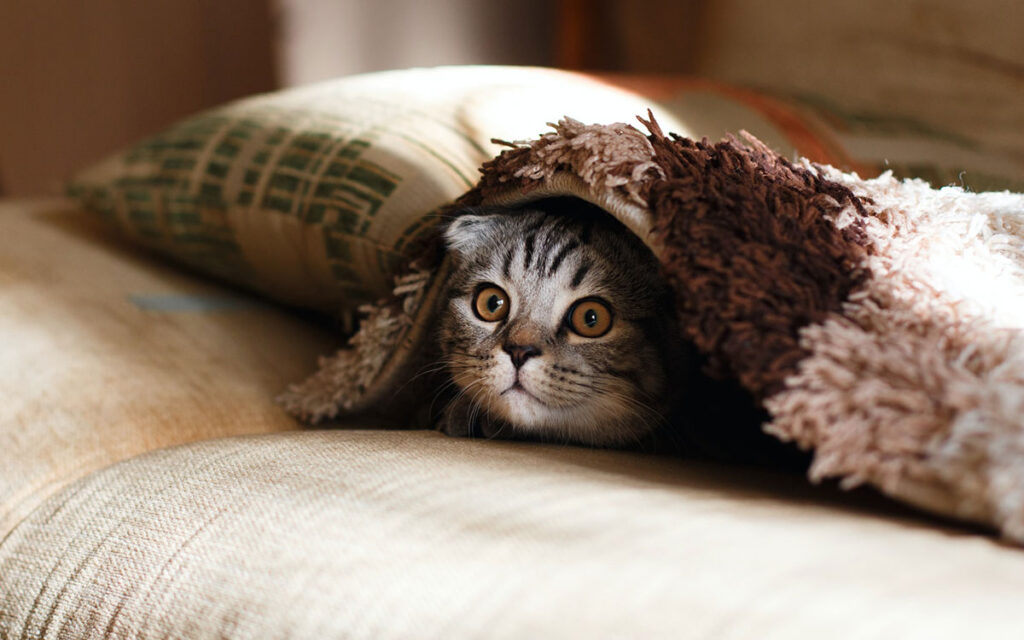Why is my cat meowing so much? It’s usually because they’re trying to tell you something, whether it’s hunger, boredom, discomfort, or emotional stress. Cats don’t meow for no reason. Each vocalization is a form of communication, and understanding what your cat is trying to say can change everything.
I learned this the hard way with Luna, my vocal tabby who turned every quiet night into a feline opera. Her late-night meows had me searching Google at 3 a.m., wondering if she was sick, sad, or simply sassy. “Why is my cat meowing so much again tonight?” became a regular question in my life.
As it turns out, cats like Luna have very specific reasons for their vocal behavior, and when you learn to decode them, you realize they’re not just making noise. They’re speaking up.
Looking for inspiration? Try our guide on solving common cat behavior issues to get a clearer picture of what your cat’s trying to communicate.
Table of Contents
Understanding Why Cats Meow So Much
What Meowing Means: A Unique Human-Feline Language
So, why is my cat meowing so much even when her needs seem met? It could be because she’s learned that meowing is the most effective way to get your attention. Unlike dogs, cats rarely meow at one another. Instead, they reserve vocalization for the one species that always responds us.
Cats use their voices as a targeted tool. They meow when they want something, and they quickly figure out what works. Whether it’s a meow for food, attention, or just companionship, your cat is communicating in the only language she knows you’ll understand: sound.
With Luna, I noticed her meows changed throughout the day. A short, chirpy greeting in the morning. A long, dramatic cry near the food bowl. A persistent call by the door. Every sound had a different tone and purpose, and once I paid attention, I realized she had been “talking” to me all along.
The Evolution of the Cat’s Voice
This isn’t random. Domestic cats have evolved to adjust their vocal pitch and style based on human feedback. Over time, they’ve learned to fine-tune their meows to match your responses. What starts as a gentle “mew” can quickly become a wailing demand if it gets results.
- Soft meows mean greetings or minor needs.
- Drawn-out vocalizations usually signal distress or frustration.
- Chirps and trills indicate excitement, often around toys or birds.
- Yowls or howls may suggest pain, heat cycles, or confusion.
So if your cat is walking around the house crying out for no obvious reason, it may be time to ask again: why is my cat meowing so much, and what change in her environment, or your routine, might have triggered it?
Don’t miss our post on best toys for indoor cats to reduce boredom-based meowing through interactive play.
A Language Built on Reinforcement
Here’s where it gets even trickier: cats learn fast. If your cat meowed and you responded by giving a treat, cuddling, or even opening a door, she made a mental note, meowing works. And like any smart creature, she’ll repeat what brings results.
Luna used to meow right before bedtime, and I’d pick her up to calm her. What happened? It became part of her nighttime routine. Not because she was anxious, but because I had trained her to expect comfort when she made noise.
Sound familiar?
In many cases, the answer to “why is my cat meowing so much?” isn’t just he, it’s us. We unintentionally reinforce behaviors without even realizing it.
But don’t worry, recognizing the cycle is the first step in breaking it. In next sections, we’ll explore training strategies to help reduce this cycle gently and effectively.
If you’ve ever stopped mid-scroll to think, why is my cat meowing so much, you’re asking the right question. The more consistent you are with how you respond, the less likely your cat will develop patterns that confuse both of you. Remember, they don’t just cry for fun, they cry because something worked once.
Top 7 Reasons Why Your Cat Is Meowing Constantly
1. Hunger or Thirst: The Most Common Culprit
Why is my cat meowing so much right before dinner? Because she knows it works. Cats are smart and habit-driven, if meowing led to food before, they’ll keep doing it until it pays off again. You might notice increased vocalizing around the same time each day, often near their food bowl or water source.
While hunger is obvious, thirst is sometimes overlooked. If your cat’s water isn’t fresh or easily accessible, she may try to “ask” for more in the only way she knows, by meowing.
To curb food-related meowing:
- Stick to consistent feeding times
- Use puzzle feeders to slow meals and add stimulation
- Ensure fresh water is available all day
This kind of vocalization is usually harmless, but if your cat starts meowing excessively around food but not eating, it may be a red flag for dental issues or digestive discomfort.
2. Boredom or Lack of Stimulation
If you’re wondering, why is my cat meowing so much even when she’s well-fed? the answer may be boredom. Especially in indoor-only environments, cats don’t get the stimulation they’d naturally find outside. That leads to vocal “complaining.”
Signs your cat may be bored:
- Meows increase after long periods of inactivity
- She meows when you’re working or distracted
- Vocalizing starts when routines shift (e.g., you leave home)
Cats thrive on mental and physical stimulation. When it’s missing, they seek attention the only way they can, by getting loud.
Want to tackle boredom head-on? Don’t miss our guide on how to stop cat from scratching furniture, it’s not just about your couch, it’s about unmet play needs that often cause vocal and destructive behavior.
3. Illness or Pain: When Meowing Signals Medical Issues
Next time you’re at a loss and wondering, why is my cat meowing so much for no reason, consider the medical angle, especially if you’ve already ruled out food and play. Early signs of illness can sound just like emotional cries, but the root cause might be deeper.
Sometimes, why is my cat meowing so much is a question best answered at the vet’s office. Excessive or sudden vocalization can be one of the first signs of discomfort or disease.
Medical reasons for increased meowing include:
- Hyperthyroidism: Common in older cats, it causes restlessness, weight loss, and loud vocalization
- Kidney Disease: Toxin buildup can cause confusion and yowling, especially at night
- Dental Pain: Makes eating uncomfortable, prompting frustrated meows near meals
- High Blood Pressure: Can affect vision or brain function, leading to strange or panicked meowing
If your cat’s behavior has changed and her meowing is louder, more frequent, or sounds distressed, a vet check is critical. Early symptoms are often subtle, and vocalization is one of the few ways cats show discomfort.
4. Stress and Anxiety
Ever rearranged the furniture and your cat meowed all night? Cats don’t love change. Stress, even from something small like a new scent or visitor, can cause excessive vocalizing.
Stress-based meows often sound:
- Low-pitched or whiny
- Repetitive and urgent
- Out-of-place (like at 3 AM)
Biggest triggers of feline anxiety:
- New people or pets
- Moving or traveling
- Litter box location changes
- Sudden changes in feeding/play routines
When asking, why is my cat meowing so much lately, consider what’s changed in their environment. Cats crave predictability, and vocalize when it’s lost.
5. Attention-Seeking Behavior
Some cats meow because they simply want you. Not food. Not toys. You.
This is especially common in:
- Single-cat homes
- Households where routines have changed (e.g., return to office)
- Breeds like Siamese, Bengal, or Sphynx known for being vocal and social
Signs it’s an attention meow:
- Your cat follows you and vocalizes
- Meowing stops when you acknowledge or pet her
- She meows when you’re on the phone, laptop, or relaxing
In these cases, your cat isn’t misbehaving, she’s connecting. But giving attention every time she meows can reinforce the habit. Structured play and intentional quiet-time affection can reset expectations.
6. Aging and Cognitive Decline
If you’re thinking, why is my cat meowing so much now that she’s older, cognitive changes may be the reason.
Senior cats (ages 11+) often develop Feline Cognitive Dysfunction (FCD), similar to dementia. It affects memory, perception, and sleep patterns, leading to nighttime meowing, disorientation, or pacing.
Common symptoms:
- Meowing at night
- Seeming “lost” in familiar rooms
- Changes in sleep or eating habits
- Vocalizing after minor changes in environment
Older cats need consistency and gentle structure. Calming products, fixed routines, and soft lighting at night can reduce anxiety-driven vocalization.
Discover great ideas like best diet for aging pets to support your senior cat’s cognitive and physical wellness.
7. Learned Habits from Unintentional Reinforcement
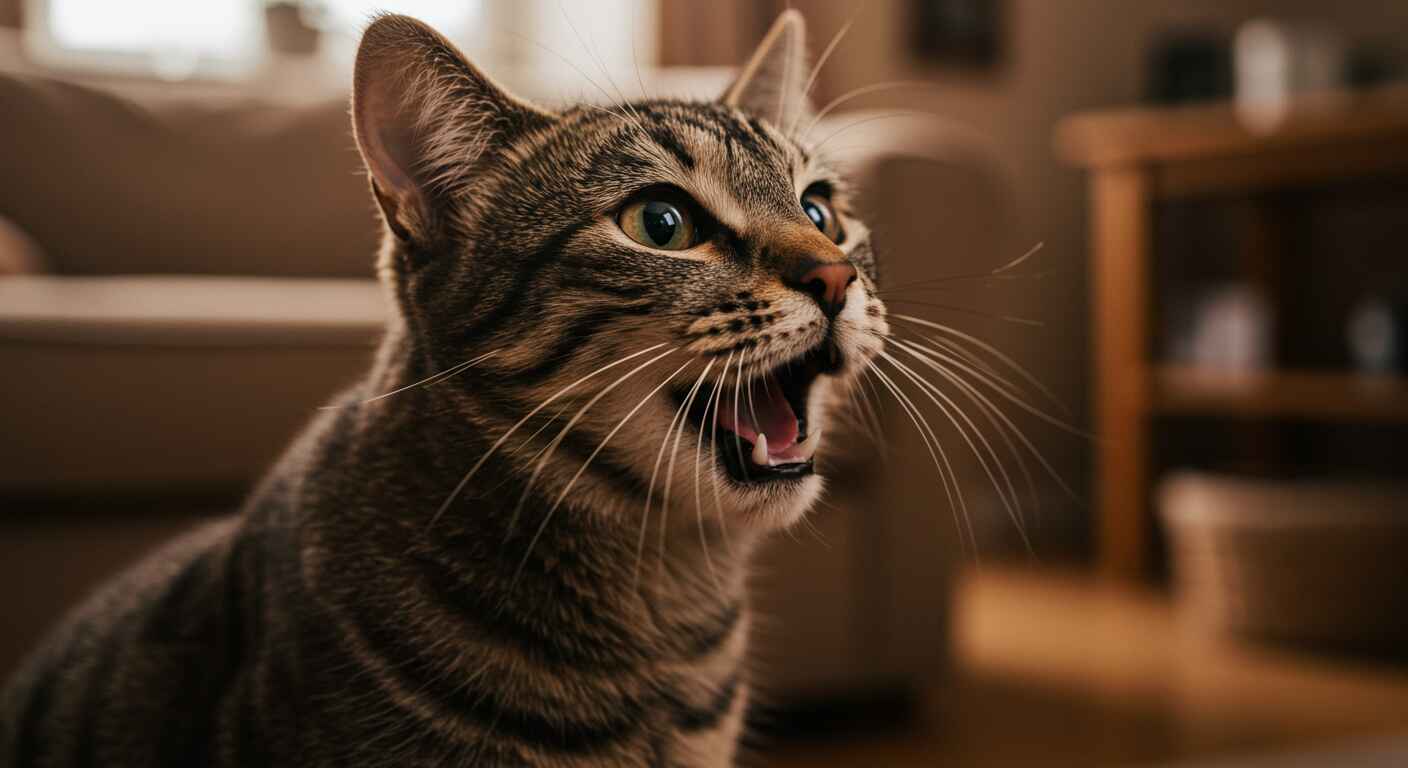
Sometimes, the answer to “why is my cat meowing so much?”… is you. That’s not blame, it’s insight. Cats learn fast. If they get food, cuddles, or door access after meowing, they’ll repeat that action every time.
If you:
- Feed right after she vocalizes
- Let her outside when she whines
- Talk to or cuddle her to quiet the noise
…you may have unintentionally trained your cat to meow for results.
The solution is simple but takes consistency:
- Reward silence, not meowing
- Use fixed feeding/play times
- Ignore nighttime vocalizing if basic needs are already met
We’ll go deeper into training strategies in Part 9, but just knowing that your behavior matters is a huge step toward calmer communication.
Emotional and Psychological Triggers
Boredom and Loneliness in Indoor Cats
Why is my cat meowing so much when she has food, toys, and a warm bed? Often, it’s not about things, it’s about connection. Indoor cats, while protected from outdoor dangers, can suffer from a lack of stimulation, especially if they live alone or their environment doesn’t change often.
Think of it this way: if your cat’s daily view never changes, her energy has nowhere to go. Vocalizing becomes her creative outlet, her request for engagement.
Key signs of boredom-related meowing:
- Meows begin when you’re not interacting with her
- She follows you from room to room vocalizing
- Vocal episodes occur at the same time every day (often early morning or evening)
This was exactly what happened with Luna. Even though she had scratch posts, a clean litter box, and a full belly, she’d start meowing loudly when I returned home from work. It wasn’t until I committed to dedicated daily play sessionsthat her “welcome home wails” turned into soft, content purrs.
Simple fixes:
- Use wand toys that mimic prey movement
- Rotate different types of toys weekly
- Add cat perches or window hammocks
- Offer bird-watching spots or feeder views
Without mental stimulation, cats get vocal. But when their minds are engaged, their meows quiet down.
Separation Anxiety and Neediness
Another answer to “why is my cat meowing so much?” she may miss you. Cats are creatures of routine and form deep bonds with their humans, even if they act aloof.
Separation anxiety is real, especially in:
- Rescue or shelter cats
- Cats who’ve lost a companion (human or animal)
- Felines in households with new schedules or less attention
Common signs:
- Loud vocalizations when you leave
- Meowing as soon as you return
- Increased clinginess or pacing
- Destructive behavior alongside meowing (scratching, knocking things over)
If your cat starts acting like a “shadow,” meowing more when you’re around or just about to leave, her cries are more emotional than practical.
Tips to soothe separation anxiety:
- Use calming pheromone diffusers or sprays
- Provide background noise (radio, TV) when you’re gone
- Give her an interactive toy before you leave
- Don’t make goodbyes/returns dramatic, keep it neutral
Looking for inspiration? Try our guide to solving common cat behavior issues for more anxiety-reducing routines and enrichment strategies.
During high-stress times, it’s normal to ask, why is my cat meowing so much since I changed my routine? Even small changes like working late or going on a short trip can trigger intense vocalizing, especially in sensitive or single-pet households.
Routine Disruptions That Stress Cats Out
Your cat loves her habits. She thrives on knowing when you’ll feed her, where she sleeps, and when she gets attention. So even small changes can cause big emotional responses, including meowing.
Have you ever:
- Rearranged furniture?
- Started a new job with different hours?
- Had guests or added a pet to the house?
If so, your cat likely noticed before you did, and responded with increased vocalization.
When cats feel emotionally unstable, their meows change. They might sound:
- Lower in pitch, almost like a moan
- Longer, with drawn-out tones
- Urgent or repetitive, especially at night
These are stress calls.
To reduce stress-based vocalizing:
- Keep feeding/play schedules consistent
- Create calm “safe zones” with cozy bedding and minimal noise
- Offer vertical spaces like shelves or cat trees for escape and control
- Use interactive play to rebuild trust and reduce stress
Cats don’t meow just for fun. They vocalize to express emotion, often ones they don’t fully understand. And like Luna, who meowed for 20 minutes after I swapped her bed to the other side of the room, they’re very sensitive to change.
When your cat’s world shifts, her voice is her anchor.
Why Is My Cat Meowing So Much at Night?
Why Cats Get Vocal at Night
If you’re lying awake wondering, why is my cat meowing so much at night, you’re not alone. Nighttime yowling is one of the most common complaints among cat owners, and for good reason. When everything else is quiet, your cat’s voice sounds even louder.
Here’s what’s going on: cats are crepuscular creatures. That means they’re naturally more active during dawn and dusk. While you’re ready to wind down, your cat may be gearing up for her “second shift.”
But biology isn’t the only reason.
Other common causes of nighttime meowing include:
- Sleeping too much during the day: excess energy builds up
- Hunger: especially if dinner was hours ago
- Anxiety or loneliness: single cats or recent changes can trigger stress
- Aging: cognitive decline can lead to confusion after dark
- Environmental changes: new pets, furniture, or even sounds can increase vocalization
Luna went through a phase where she’d sit by the bedroom door and sing the song of her people, loudly. I tried everything from earlier dinners to scolding (which didn’t work). Eventually, I realized her night meows were tied to boredom and lack of routine.
Simple Fixes for a Better Night’s Sleep
You don’t have to suffer through 3 a.m. meowing forever. With a few changes, you can reduce or even eliminate nighttime vocalizing.
Start by asking:
- Is your cat getting at least two active play sessions per day?
- Is her last meal close to bedtime?
- Is the litter box clean and accessible overnight?
- Does a soft light help reduce nighttime confusion?
- Are you unknowingly rewarding the behavior?
Here’s a quick cheat sheet:
| Nighttime Trigger | Practical Solution |
|---|---|
| Restlessness | Schedule an energetic play session before bed |
| Hunger | Feed a small, protein-rich snack late evening |
| Anxiety or loneliness | Let her sleep nearby or use calming pheromones |
| Cognitive confusion (older cats) | Leave on a nightlight; maintain routine |
| Learned habit | Ignore meowing if all needs are met |
Avoid “giving in” at night. Even getting up once to feed or pet your cat reinforces the behavior. Cats are smart: if it works once, they’ll try it again, and louder.
With Luna, I made a few shifts: playtime before bed, timed feeder at 10 PM, and a nightlight in the hallway. Within a week, the nighttime serenades stopped.
When Night Meowing Signals Something Bigger
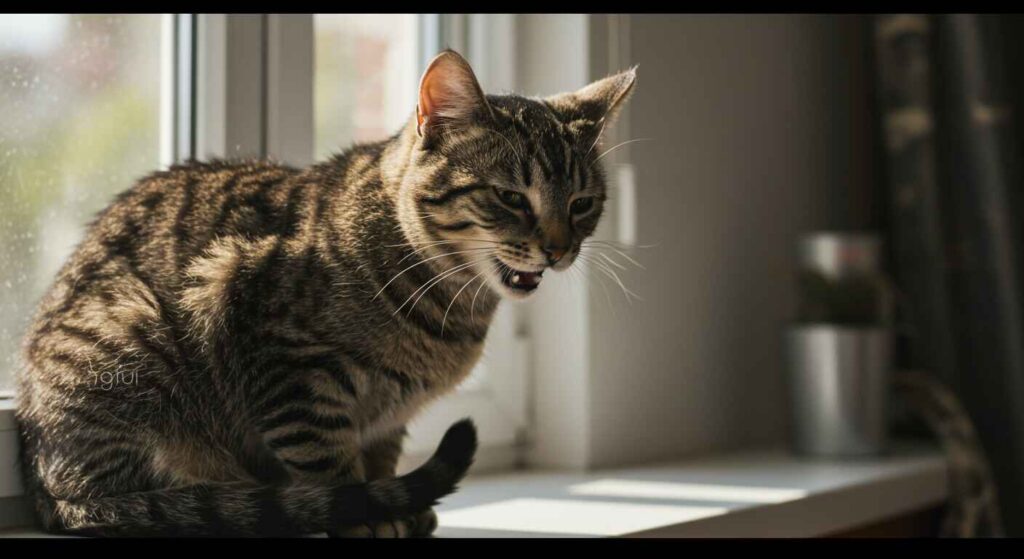
Sometimes, why is my cat meowing so much at night points to something deeper, like pain, illness, or cognitive decline. This is especially common in older cats or those with medical conditions.
Watch for:
- Meowing paired with pacing, panting, or hiding
- Sudden increase in nighttime vocalizations
- Confusion, accidents outside the litter box, or disorientation
In these cases, it’s best to consult your vet. Even if everything seems fine during the day, nighttime symptoms can hint at underlying conditions.
Nighttime meowing isn’t always just annoying, it can be a red flag.
If your nights are suddenly louder and you’re asking, why is my cat meowing so much now compared to before, start by checking what shifted in her daily rhythm. Cats are time-sensitive creatures, and even subtle changes can disrupt their peace.
What Your Cat’s Body Language Tells You
Vocal Clues + Visual Cues = Clear Communication
Understanding your cat goes beyond just asking, why is my cat meowing so much? You also need to look at what her body is doing while she’s meowing. Cats are masters of silent signals, ears, tails, posture, and eyes all contribute to the message.
Pairing vocal behavior with body language is key to understanding whether your cat is:
- Playful
- Anxious
- Demanding
- Unwell
For instance:
- Tail up, ears forward, soft meow = friendly greeting
- Tense posture, flicking tail, low growl-meow combo = agitation or fear
- Crouched body, loud and repetitive meows = stress or need for reassurance
So, if you’ve been wondering why is my cat meowing so much and acting strange, her body might be saying more than her voice. Tune into both channels.
Many cat parents miss key cues because they only focus on sound—but if you’ve asked yourself, why is my cat meowing so much, observing her posture might reveal what her voice alone doesn’t.
How to Read Your Cat’s Body While She Meows
Let’s break it down by body part. Use this as a checklist next time your cat gets vocal:
| Body Part | What to Watch For | What It Might Mean |
|---|---|---|
| Ears | Forward (alert), back (agitated), twitching (conflicted) | Context for meowing tone |
| Tail | Up and curled (happy), thumping (annoyed), puffed (scared) | Amplifies emotion behind vocalizing |
| Eyes | Slow blinking (calm), wide pupils (fear or excitement) | Add emotional tone to vocalization |
| Whiskers | Forward (focused), flat back (stressed) | Pair with volume of meow to assess urgency |
| Body posture | Relaxed vs. stiff, crouched vs. upright | Reinforces if meowing is casual or concerning |
When Luna would start pacing and meowing around 10 p.m., I used to assume she wanted food. But once I noticed her tail twitching and ears turned sideways, I realized it wasn’t hunger, it was overstimulation. She needed calm, not snacks.
Why is my cat meowing so much while pacing isn’t just about sound, it’s about what her entire body is telling you.
Combining Behavior and Body Language to Find the “Why”
Cats rarely vocalize without purpose. The more you observe how their posture changes during excessive meowing episodes, the easier it becomes to understand whether they’re communicating:
- Discomfort
- Loneliness
- Excitement
- Disorientation
Still scratching your head and asking, “Why is my cat meowing so much for no clear reason?” Consider recording her behavior. A video can help identify patterns in both sound and body language, and give you something valuable to show your vet if needed.
Understanding how physical cues complement vocal signals helps reduce misunderstandings and creates stronger emotional bonds.
Is Excessive Meowing Normal or a Health Red Flag?
When “Talkative” Becomes “Too Much”
Every cat meows, but how much is too much? If you’ve been repeatedly asking, why is my cat meowing so much, it may be time to shift from observation to investigation.
Occasional vocalizing is normal. But excessive meowing, louder, more frequent, or out of character, can be your cat’s way of signaling something serious. Cats may not speak our language, but when their behavior changes, especially vocally, they’re waving a red flag.
Pay attention to the context:
- Is the meowing new or increasing suddenly?
- Is it paired with changes in energy, appetite, or mobility?
- Does your cat sound more distressed than usual?
Answering why is my cat meowing so much lately starts with noticing what’s different, because normal behavior rarely changes without cause.
When to Worry About Vocal Changes
While some breeds like Siamese or Bengals are naturally vocal, a noticeable change in frequency, volume, or tone deserves attention, especially if your cat was previously quiet.
Medical warning signs that can accompany excessive vocalizing:
- Meowing while using the litter box (possible UTI or blockage)
- Yowling late at night, especially in senior cats
- Increased thirst, vomiting, or changes in appetite
- Restlessness or hiding
- Weight loss or poor grooming habits
If you find yourself googling, “Why is my cat meowing so much all of a sudden?” don’t wait. Cats often suffer in silence. But when they speak up, they mean it.
Talk to Your Vet: Vocal Changes Are Clues
The good news? Many conditions tied to constant meowing are manageable when caught early. A quick vet visit can help rule out common causes like:
- Hyperthyroidism
- High blood pressure
- Kidney disease
- Dental pain
- Feline Cognitive Dysfunction (in older cats)
Bring a video of the meowing if you can, it gives your vet critical insight into pitch, urgency, and context. Also note when the vocalizing happens: after eating, during the night, or only when alone?
In many cases, pet parents who asked why is my cat meowing so much for no reason later found out their cat was in discomfort or distress, and vocal changes were the first symptom.
Many cat parents delay vet visits because they assume it’s behavioral. But if you’ve been thinking, why is my cat meowing so much all the time lately, it’s worth checking if there’s a physical reason behind it.
Why Ignoring It Could Make Things Worse
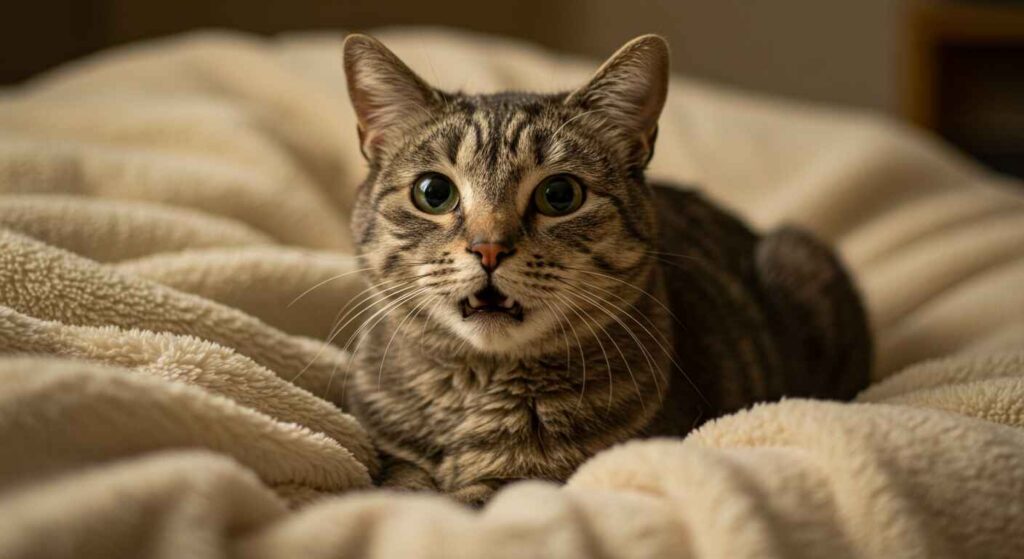
Waiting too long to respond to excessive meowing can lead to bigger problems. Whether it’s behavioral reinforcement or a health concern, vocal issues usually don’t go away on their own.
Even if the cause is emotional stress, anxiety, or boredom, ignoring your cat’s voice tells her you’re not listening. That can increase her stress and amplify her meows.
If your gut says, “Why is my cat meowing so much lately, this isn’t normal,” you’re probably right. Trust your instinct, take notes, and talk to your vet.
How to Calm a Cat That Meows a Lot
Finally Ready to Ask: How Do I Quiet the Meows?
If you’ve hit your limit and keep asking yourself, why is my cat meowing so much, you’re likely dealing with something deeper than simple boredom or hunger. This behavior, especially when it becomes a daily pattern, is often tied to emotional signals or learned habits.
And the good news? With just a few changes in how you respond and structure your cat’s day, you can start to turn the volume down, gently, and for good.
Daily Routine: The Secret to Quieter Days
When your cat doesn’t know what to expect, her natural reaction is to communicate, loudly. Many pet owners don’t realize how powerful routine is in answering the question: why is my cat meowing so much even when she’s not hungry or in pain?
Here’s how to create a calming routine:
- Feed meals at the same time every day
- Play actively twice a day, morning and evening
- Clean the litter box consistently
- Avoid unpredictable changes in interaction
Cats don’t need complex schedules. They need consistency. Once that’s restored, most cats begin to settle, and their vocal behavior often drops without direct correction.
Environmental Triggers Can Lead to Vocal Stress
Many people only look at their cat’s behavior, but ignore the environment that may be fueling it. A loud space, constant activity, or recent changes can result in louder, more frequent meowing.
If you’ve been thinking, why is my cat meowing so much lately, especially at night, it could be her way of coping with stress.
Try this:
- Provide a quiet retreat or covered bed
- Use pheromone diffusers in high-traffic areas
- Set up elevated perches and safe zones
- Keep lights low in the evening, especially for senior cats
Reducing environmental anxiety often quiets the noise more effectively than discipline ever could.
Stop Reinforcing Meowing, Even Accidentally
Sometimes, the real answer to why is my cat meowing so much lies in your response. Feeding after a vocal demand, offering cuddles, or even yelling can reinforce the behavior.
Fix it by:
- Ignoring unnecessary meows
- Rewarding silence instead
- Scheduling attention, rather than reacting to requests
- Using clicker training to promote quiet behavior
Your cat learns through repetition. Stop rewarding the noise, and you’ll start seeing more silence.
Patience Pays Off
Don’t expect overnight success. It may take several days, or weeks, for your cat to adjust to new boundaries and routines.
Ask yourself:
- Am I being consistent with meals and play?
- Am I responding only to calm behavior?
- Have I removed emotional or physical triggers?
Eventually, you’ll stop asking, “Why is my cat meowing so much every single day?” and start enjoying a more peaceful, connected routine with your furry companion.
Common Myths About Cat Meowing
“Cats Meow for No Reason”
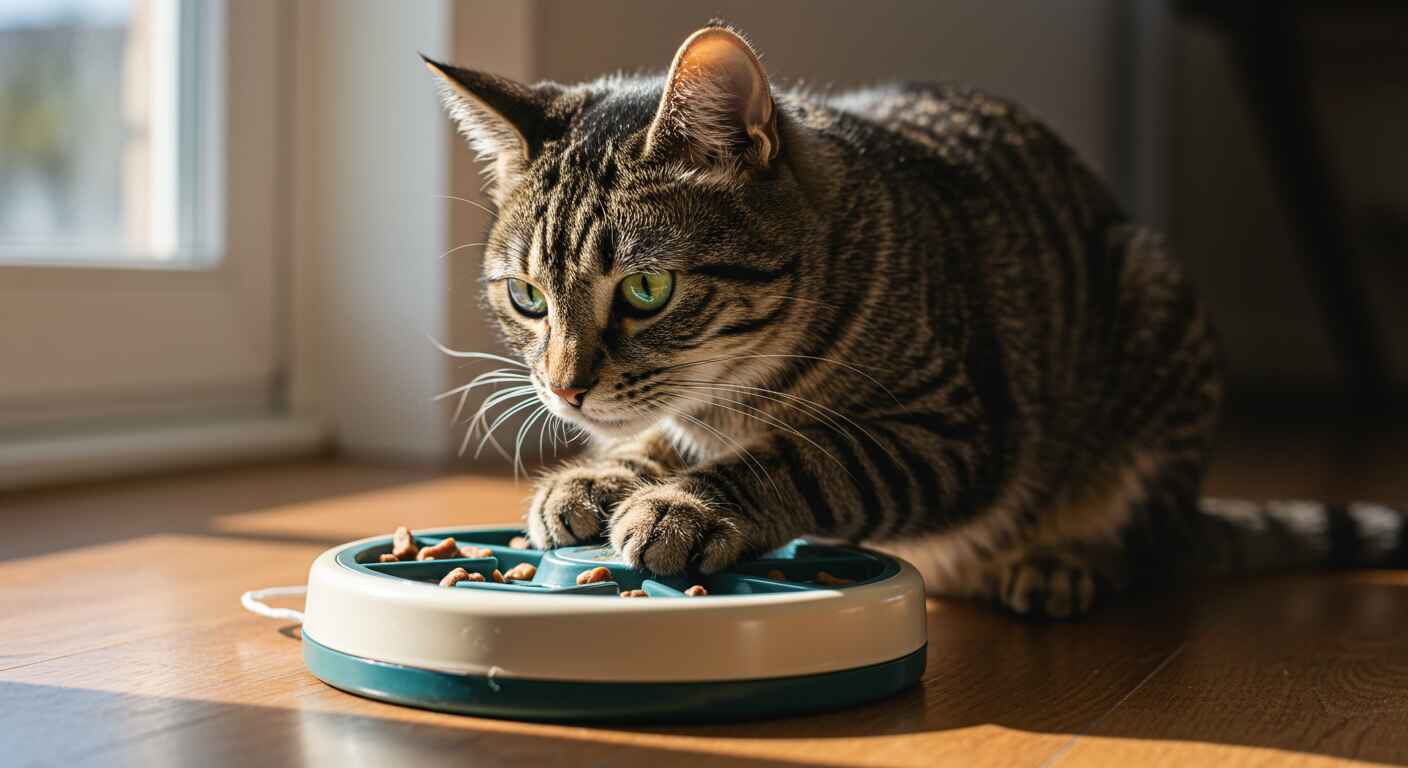
If you’ve ever thought, “why is my cat meowing so much when everything seems fine?”, you’re not alone, and you’re not wrong to ask. But the idea that cats meow “just because” is one of the most damaging misconceptions out there.
The truth? Cats never vocalize without purpose. You may not recognize the cause, but your cat’s brain, body, or emotions are processing something, boredom, stress, memory decline, or even subtle pain.
That soft chirp or 2 a.m. yowl is part of an evolved communication system. Ignoring it outright can mean missing important signs.
“Only Some Cats Are Vocal, It’s Just Her Personality”
It’s true: some breeds, like Siamese or Bengals, are known for being more vocal. But sudden or increased vocalizing isn’t just personality, it’s often a sign that something needs attention.
If you’re asking yourself, why is my cat meowing so much more lately, the cause could be:
- Anxiety from household changes
- A response to new feeding or attention routines
- Age-related cognitive changes
- Discomfort, pain, or medical conditions
- A reaction to unintentional reinforcement from you
Even naturally chatty cats can change their “tone.” Pay attention to volume, frequency, and timing.
“You Should Ignore All Meowing to Stop It”
This advice comes from a behavioral truth, don’t reward demanding behavior, but it’s incomplete. Yes, you should avoid reinforcing constant meowing with treats or attention. But completely ignoring your cat could leave real needs unmet.
Instead of ignoring everything, decode what type of meow it is:
- A short, chirpy meow = likely a greeting
- A loud, drawn-out cry = stress or urgency
- Nighttime vocalizing = anxiety, confusion, or energy buildup
Use context, body language, and patterns to determine whether your cat is communicating or just testing boundaries.
Still thinking, why is my cat meowing so much at random times? Try keeping a log of when it happens and what’s going on around her. Patterns usually appear within days.
“She’s Just Being Dramatic”
This one stings a little, because many cat parents dismiss their pet’s vocalizing as attention-seeking drama. And sure, some cats do meow to get a reaction. But even that behavior comes from a real need: connection.
If your cat has learned that meowing brings you closer, she’s simply using the tool that works. The better question isn’t whether she’s dramatic, it’s, why is my cat meowing so much that she feels the need to “perform”?
Often, the answer lies in:
- Boredom and lack of stimulation
- Missed routines
- Emotional needs like reassurance
- Lack of enrichment in her environment
Treat vocal behavior as communication, not manipulation. Respond with calm, structure, and curiosity instead of frustration.
Training and Enrichment Ideas to Reduce Meowing
Behavior Isn’t Broken, It’s Learned (and Reversible)
Still asking yourself, why is my cat meowing so much even after vet visits, toys, and a full food bowl? Then it’s time to zoom in on habits and engagement. Cats are clever. They adapt fast, and often, they’ve trained you as much as you’ve trained them.
When meowing becomes the go-to tool for food, attention, or comfort, it turns into a loop. Break that loop with a combination of behavioral training and daily enrichment.
Training Techniques That Actually Work
Yes, cats can be trained, and the process starts with rewarding the behavior you want, not reacting to the one you don’t.
Here’s how to do it:
| Problem Behavior | Replace With | Tool to Use |
|---|---|---|
| Meowing for food | Scheduled feeding | Automatic/timed feeder |
| Vocalizing for attention | Calm response after silence | Clicker + treat |
| Nighttime crying | Pre-bed play + no response | Laser pointer, wand toy |
| Vocal boredom complaints | Interactive, solo-play toys | Puzzle feeders, tunnels |
When you think, why is my cat meowing so much when I’m clearly not responding, remember, if you ever gave in, your cat learned that meowing sometimes works. And sometimes is enough for them to keep trying.
The fix is consistency. No mixed signals. Silence = reward.
Mental Enrichment Is Essential
A bored cat is a vocal cat. If your pet doesn’t have enough stimulation throughout the day, she’ll fill the quiet with meows, especially during dawn and dusk.
Easy ways to enrich your cat’s routine:
- Rotate toys weekly to keep novelty fresh
- Use food puzzles instead of open bowls
- Create vertical spaces for climbing and viewing
- Set up bird feeders outside windows
- Provide tunnels, scratchers, and texture zones
These simple changes reduce the need to ask, why is my cat meowing so much out of nowhere? Because the answer is usually: she’s bored and trying to cope.
Consistency = Peace (Eventually)
Training a cat out of vocal habits takes time. But it works. Stick to:
- Predictable schedules
- Calm energy
- Positive reinforcement for quiet behavior
- Ignoring attention-seeking meows
And yes, it’s okay to talk to your cat, just do it after she’s quiet.
Over time, the question, why is my cat meowing so much every day, turns into, “Wow, she’s really mellowed out.”
That transformation is real, and it starts with structure.
FAQ Section: Based on Provided Questions
Why does my cat meow so much for no reason?
If your cat is meowing for “no reason,” it likely means you’re missing a cue. She may be bored, anxious, trying to get your attention, or even reacting to small environmental triggers. Medical issues can also cause changes in vocal behavior, so don’t ignore it.
Sometimes, why is my cat meowing so much for no reason is just our way of saying we haven’t figured out her language yet.
When should I be worried about my cat meowing?
Be concerned if the meowing:
Starts suddenly and is loud or painful-sounding
Comes with weight loss, vomiting, or hiding
Happens more at night, especially in older cats
These could be signs of illness, injury, or cognitive issues. If you’re wondering why is my cat meowing so much all of a sudden, a vet visit is the right move.
Why is my cat meowing so much at nothing?
It may seem like “nothing” to you, but your cat could be responding to sounds you can’t hear (like rodents in walls), reflections, boredom, or even stress. Cats are highly sensitive to subtle shifts in their environment.
Why is my cat meowing so much at nothing might just mean she’s overstimulated or trying to communicate a subtle discomfort.
Why does a cat walk around the house meowing?
Roaming and meowing often go hand in hand. It may be attention-seeking, anxiety, or a signal that something is off, especially if the meowing seems urgent or constant.
If your cat walks and meows at night, you’re not alone in thinking why is my cat meowing so much all the time, that pacing behavior can often be fixed with stimulation, play, or vet advice.
Can excessive meowing be trained out?
Yes, through consistency and positive reinforcement. Ignore unwanted meows, reward calm moments, and offer structured play and feeding schedules. Most cats respond well to routine, and you’ll stop wondering why is my cat meowing so much every single day once the triggers are removed.
Is my cat just talking to me?
Absolutely. Many cats meow simply to connect. This is especially true for certain breeds like Siamese or Bengals. That said, why is my cat meowing so much when I already fed her might mean she wants something else, your attention, playtime, or a clean litter box.
Can cats meow just for attention?
Absolutely. Many cats learn that meowing gets a response, whether it’s food, cuddles, or conversation. This is common in single-cat households or after schedule changes. The trick is to avoid reinforcing the behavior. Respond only when your cat is calm, and redirect her with structured play and affection routines.
What does my cat’s body language mean when it meows?
Your cat’s body language adds critical context to her voice. For example:
Tail up + soft meow = friendly greeting
Twitching tail + loud cry = irritation or stress
Wide eyes + pacing + yowling = confusion or anxiety
If you’re still asking, why is my cat meowing so much even after being fed and played with, observe her ears, tail, and eyes. These visual cues will help decode her emotional state.
Is excessive meowing a sign of illness?
Yes, it can be. If you’ve been wondering, why is my cat meowing so much all of a sudden, it may be her way of telling you something’s wrong. Health issues like hyperthyroidism, high blood pressure, kidney disease, or painoften trigger a sudden increase in vocal behavior. If the meowing sounds distressed or is paired with other changes (like appetite loss or confusion), contact your vet.
Every Meow Has Meaning, Are You Listening?
If you’ve followed this guide wondering, why is my cat meowing so much, you now know there’s no one-size-fits-all answer. Cats meow for reasons both simple and complex, ranging from routine needs to medical red flags and emotional stress.
Instead of tuning it out, you’ve learned to tune in. Whether your cat is crying at night, pacing during the day, or vocalizing after meals, each behavior is a message. Asking why is my cat meowing so much at odd times becomes your first step toward helping her feel understood and secure.
You’re not just reducing noise, you’re building trust. You’re creating a routine, offering stimulation, and watching for those subtle body language cues that complete the conversation.
And when the thought creeps back, why is my cat meowing so much again today, you’ll know how to check in with her environment, her health, and her heart. That’s what real pet parenting looks like.
Because cats don’t just speak with their voices. They speak with timing, tone, and trust. And if you’re still asking, why is my cat meowing so much, chances are, she believes you’re listening now.


